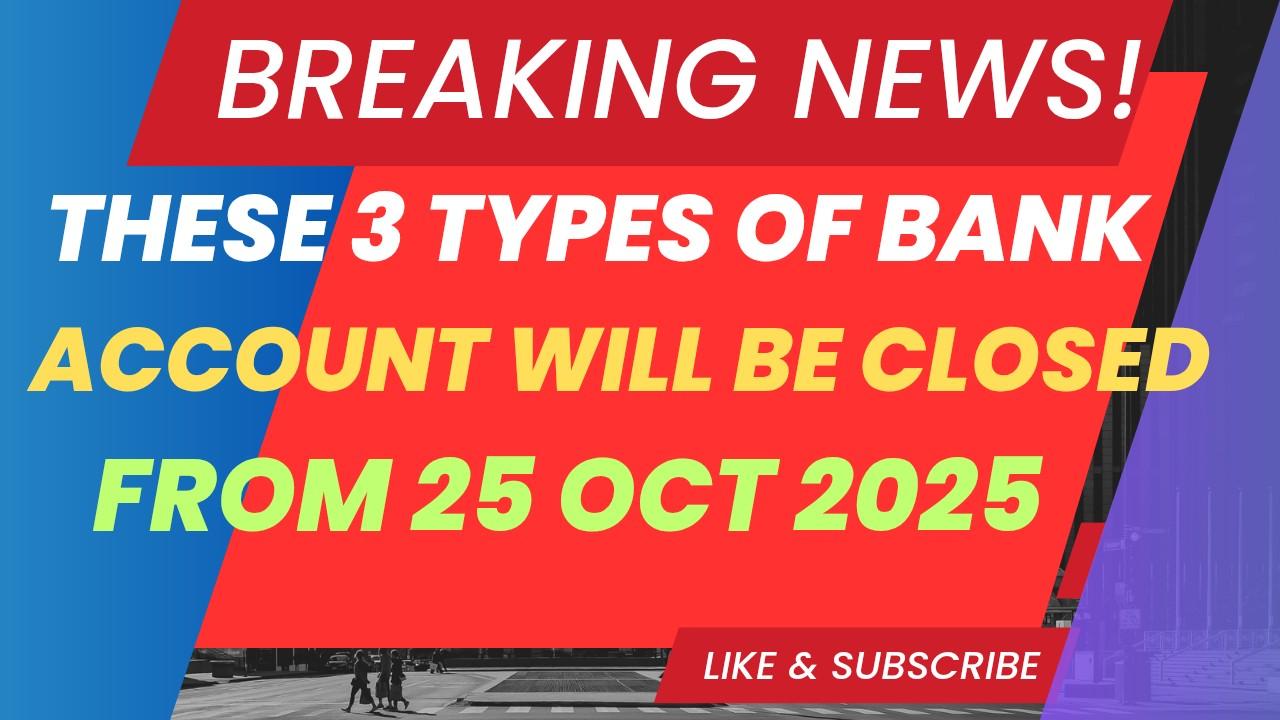Attention Account Holders! RBI’s New Rules Will Shut Down These 3 Types of Bank Accounts from October 25, 2025

Attention Account Holders! RBI’s New Rules Will Shut Down These 3 Types of Bank Accounts from October 25, 2025
The Reserve Bank of India (RBI) has unveiled a new set of banking laws that will take effect on October 25, 2025, as a significant step towards bolstering India's financial security framework. According to these recommendations, three types of bank accounts — dormant, inactive, and zero balance — would be cancelled or have operational limits. The move, which aims to promote openness and avoid financial fraud, is likely to strengthen the country's banking sector by increasing discipline and security.
According to the RBI's most recent circular, these new rules are part of the central bank's continuous efforts to identify and delete high-risk or non-operational accounts, which are frequent targets for cyber fraud and money laundering. With millions of such accounts remaining dormant in public and private sector banks, the RBI believes this move will help clean up the financial ecosystem and guarantee clients' cash stay secure and traceable.
Which Bank Accounts Will Be Closed Under RBI’s New Rules?
The RBI has defined three types of bank accounts that fall under the closure or restriction mandate:
1. Dormant Accounts: These are accounts that have not had any transactions in the last two years, including deposits, withdrawals, or digital activity. Such accounts are more likely to be used fraudulently, and banks will now restrict or close them if the customer does not reactivate them.
2. Inactive Accounts: Accounts that haven't had any customer-initiated transactions in a year will be marked as inactive. Inactive accounts, like dormant accounts, are subject to examination, and consumers must complete at least one transaction to preserve their active status.
3. Zero Balance Accounts: These are accounts that have no funds and have been inactive for an extended length of time. According to the new standards, banks will shut such accounts permanently because they serve no operational purpose and frequently impose unneeded load to the system.
Why RBI Is Closing These Accounts
The RBI's move derives from increased worries about financial irregularities and cybercrime involving dormant or inactive accounts. Such accounts are frequently used by scammers to launder money, make criminal activities, or gain unauthorised access to the banking system.
The RBI hopes that shutting these accounts will increase customer security, banking efficiency, and accountability. The move will also encourage account holders to interact with their bank accounts on a regular basis, resulting in greater active financial engagement and knowledge.
How Customers Can Avoid Account Closure
Account holders need not worry; there are simple ways to keep their accounts operational. A simple transaction, such as a deposit, withdrawal, or online transfer, can keep an account from being categorised as dormant or inactive. This can be accomplished by visiting a bank branch, withdrawing money from an ATM, using mobile banking, or via internet banking.
To avoid automatic termination, customers with zero balance accounts must maintain some level of activity or balance. Before initiating any closure action, banks are required to provide numerous alerts by SMS, email, or post. As a result, customers must be vigilant to all notifications from their respective institutions and act quickly.
Benefits of RBI’s New Banking Rules
The new RBI guidelines are intended to provide significant long-term benefits to clients and banks. For starters, they will help lower the danger of identity theft and financial fraud, as inactive accounts are common targets for hackers. Second, it will improve operational efficiency for banks by allowing them to focus on active accounts, resulting in better customer service and system transparency.
Furthermore, the move is consistent with the government's Digital India strategy, as users would be encouraged to use digital banking channels more regularly for transactions and account management. This step also improves financial hygiene by ensuring that consumers maintain consistent activity in their accounts, making them easier to track and manage.
What Happens If Your Account Is Closed?
If your account is closed due to the new RBI restrictions, you can reopen it by visiting your bank branch, giving identity verification, and submitting a written application. However, this process can take some time and may necessitate additional documents. As a result, the RBI strongly recommends account holders to keep their accounts open and avoid unwarranted closures.
The Bigger Picture: A Safer, Smarter Banking System
Experts feel that this decision represents the RBI's overarching goal of creating a fraud-free, transparent, and customer-friendly financial environment. As India's financial infrastructure grows, the security of digital transactions and client data becomes increasingly important. The RBI's strengthening of these restrictions reinforces its commitment to protecting banks and customers from escalating cyber and operational risks.
This new rule will become effective for all institutions on October 25, 2025. Customers are recommended to monitor their account activity right away and conduct at least one transaction if their account has been inactive. Staying proactive today can save you from problems tomorrow.
Disclaimer: This article is for informational purposes only. All information regarding the RBI’s banking rules has been compiled from verified sources, including the official Reserve Bank of India circulars and national financial reports. Readers are advised to check with their respective banks for specific updates related to their accounts.